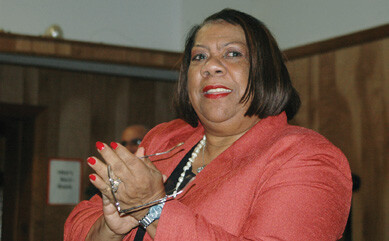
Certified Lay Ministers launch into new calling
BY LINDA WORTHINGTON
UMCONNECTION STAFF
Commitment. Dedication. Calling. These words are much used by the participants in the Discipleship Academy's School of Certified Lay Ministry, which held its first of six sessions in each region Sept. 27.
 At McKendree-Simms-Brookland UMC in Washington, D.C., Sandra King, from Asbury UMC, introduced 16 women and men to a new opportunity in The United Methodist Church to be certified lay ministers. She challenged them to pray.
At McKendree-Simms-Brookland UMC in Washington, D.C., Sandra King, from Asbury UMC, introduced 16 women and men to a new opportunity in The United Methodist Church to be certified lay ministers. She challenged them to pray.
"We're going to be certified lay ministers so we already know how to pray," she said as she asked them to sign up for devotions at the beginning or end of each of the next five classes. "As a certified lay minister, you'll have to pray often."
The 12 women and four men, coming to class with commitment in their hearts, are just beginning a four module course of study, taking place through 2009. In order to be certified, the candidate must complete all four modules.
Completing the course does not guarantee certification, King said. There are several other steps in addition to the required completion of the full course. "Make sure this is what you want," she said.
"If you're going to be a CLM, you need to know how to talk to people and to each other," King said. "You can't tell what you don't know. If you don't know God's love, how can you reflect it to others?"
She asked them to tell their stories of how they know God's love.
"CLM offers me an opportunity to make good on my promise to God to go where he wants me to go," said a young man from A.P. Shaw UMC in Washington. He was in the military when the "Jesus-freaks got me and I accepted Jesus," he said. That led him to Bible College, being active in his church and to this day of greater commitment.
Filbert Benjamin from Emory UMC came to Washington in 1992 from Guinea. "I had a checkered life," he said. That changed. "God used my three wives (he was widowed twice) to bring me to this place," he said. It's a serious undertaking and commitment."
He attended a conference for black men in Atlanta in 1998, which was pivotal. "From then until now, I've been God's man," he said.
King explained that a certified lay minister is not an ordained role. "We're all called to be ministers and we need to be serious about responding to that call," she said. But there are many ministries.
"CLM is an opportunity to use our gifts to help people move to faithful ministry in whatever place they're called," she said.
A certified lay minister is "part of a ministry team" working together under the supervision of the pastor, whom she or he assists. Others on the team include lay speakers and the lay leader.
Once the course is completed and a person is certified, "you can be sent anywhere," King said. "If you can't leave Shaw or Grace (your home church), stop." She added they could take the course, but unless willing and able to serve where sent, they would not be certified.
The Rev. Helen Fleming, the conference staff leading the Certified Lay Ministry program, spoke briefly to the class, confirming what many already realized, "You have an excellent teacher," she said. "Look at your negative self, and respond to God's love."
"What was the first time you felt called?" King asked.
The answers were perhaps surprising.
"I was called to sing."
"I was called to be a mother," one young woman said. "It was not the call I wanted, but I love it."
"I was called to civil rights, to be a community activist."
"I was called to the military."
"I was called to be a leader in my church," said Anjanee Thomas from Community UMC in Washington, D.C. The youngest in the class at 26, she is a school teacher in Prince Georges County. She is also a lay speaker and the assistant lay leader in her church. "I felt God wanted me for more," she said.
That perhaps more than any other words reflects what these pioneers in certified lay ministry feel as they launch into the two-year program.

Login/Register to leave comment